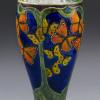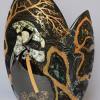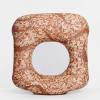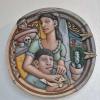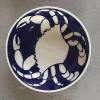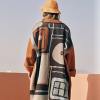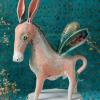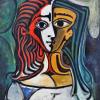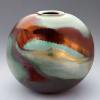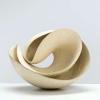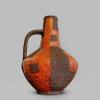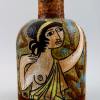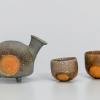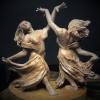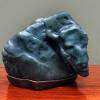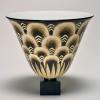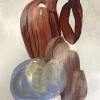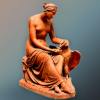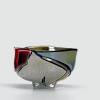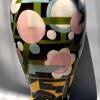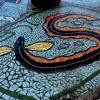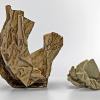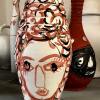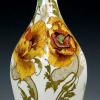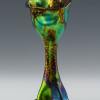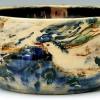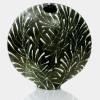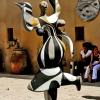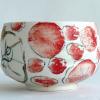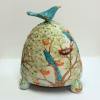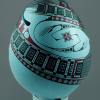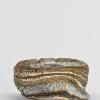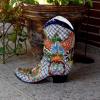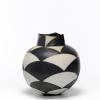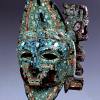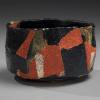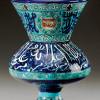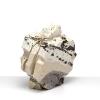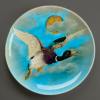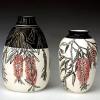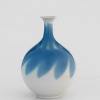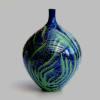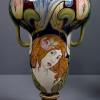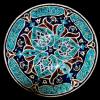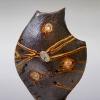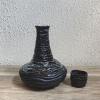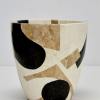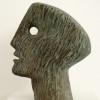From the first time Neanderthal man held aloft a lump of clay contemplating what he could use it for, he more then likely posed the question … functional or decorative? ” Will I make a bowl for eating my nuts and berries or should I indulge my creativity and make a clay statue of my beautiful wife. How about a sun-dial so I don’t sleep in. Maybe I could do some raku, but first I have to figure out how to make fire….”
On a more serious note, clay figures have been around for a very long time and I speculate that their earliest use would have been for some kind of idolatry.
The figure sculptures of Greek Antiquity were not naturalistic, for their forms were idealized and geometric. Figurative art is itself based upon a tacit understanding of abstracted shapes.This has been referred to as the ” Egyptian method ” where there was an adherence to that which was already known, rather then what was being witnessed. This idealization eventually gave way to observation, and a figurative art which balanced idealized geometry with greater realism was seen in Classical sculpture by 480 B.C. This reliance on visual observation was known by the Greeks as ” mimesis “. This style of figurative art , characterised by attempts to reconcile these opposing principles, remained until the time of the Impressionists.
A figurine is a statuette that can represent a human form, a deity or an animal, and can be either realistic or iconic. The earliest were made of stone or clay, and later versions were made with ceramics, metal , glass and wood.
This terra-cotta figure is in honor of the goddesses Isis and Aphrodite.
( Metropolitan Museum of Art in New York. )
The most common materials for figurines were porcelain and various ceramics.. There are many early examples from China where it originated, which drove experimentation in Europe to replicate the process. The first European porcelain figurines were produced in a process mastered in Germany were known as Meissen ware, after the city where it began.
The ushabti was a funerary figurine used in Ancient Egypt. Ushabtis were placed in tombs among the grave goods and were intended to act as substitutes for the deceased, should he/she be called upon to do manual labor in the afterlife. They were used from the Middle Kingdom (around 1900 BC) until the end of the Ptolemaic Period nearly 2000 years later.
Most ushabtis were of minor size, and many produced in multiples – they sometimes covered the floor around a sarcophagus. Exceptional ushabtis are of larger size, or produced as a one of-a-kind master work.
The ushabtis were servant figures that carried out the tasks required of the deceased in the underworld.
Here is a collection of figurines ranging from ancient to modern :
Kate Gardiner – odyssey-center
Isis and Horus
∞
Lidija Tkalcevic – ACGA ↓
Osirus 2010 – Cheryl Tall
Eel Walker – Mark Newman
This sculpture was eventually cast in bronze.
Artful Ceramics
Charlene Doiron Reinhart
Liz Bryant
the buddhabuilder
Windy by Piotr Konsk
NEW YEARS DIVA 2 by Nicole West
Russianhead
∞
Patricia Boyd ↓
Tribal Stand
Kindred Spirits 11
Blessed Harvest – Patricia Boyd
” Can you see me ” Adele Macy
Virginia Rigney
∞
Marina Bauguil ↓
Heart Bird – Marina Bauguil
Group
Tree Spirit
Obsedian ceramic-figure
Fred Yokel
Female Effigy Vessel
Democratic Republic of Congo. Mangbetu. Early 20th century
At the time, elongated foreheads were considered highly attractive. To achieve this look, royal women wrapped their heads with rope and wove their hair into a conical basket structure.
“Dynasty Ceramic Sculpture”
Sherri K McEuen
Ceramic Angel Raku Keramik figure
Margit Hohenberger
Mouseweb – Michelle Hall
Art Deco Figurine
Whisper – Marina Bauguil
Sally Hook – Jongleur noir et blanc
Artist Sally Hook – Jongleur Jeune et Rouge







































